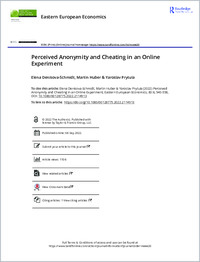Perceived Anonymity and Cheating in an Online Experiment
BP2-STS
- Denisova-Schmidt, Elena ORCID School of Humanities and Social Sciences (SHSS-HSG), University of St.Gallen (HSG), St.Gallen, Switzerland
- Huber, Martin ORCID Department of Economics, University of Fribourg, Fribourg, Switzerland
- Prytula, Yaroslav ORCID Faculty of Applied Sciences, Ukrainian Catholic University, Lviv, Ukraine
- 06.09.2022
Published in:
- Eastern European Economics. - Informa UK Limited. - 2022, vol. 60, no. 6, p. 540-558
English
This paper presents the outcomes of an online coin-tossing experiment evaluating cheating behavior among Ukrainian students. Over 1,500 participants were asked to make ten coin tosses and were randomly assigned to one of the three treatment groups tossing coins (1) online, (2) manually, or (3) having the choice between tossing manually or online. The study outcomes suggest that students are more inclined to cheat when they perceive the coin toss to be more “private.” Moreover, the students’ attitudes toward corruption appear to matter for the extent of their cheating, while socio-demographic characteristics were less important.
- Faculty
- Faculté des sciences économiques et sociales et du management
- Department
- Département d'économie politique
- Language
-
- English
- Classification
- Economics
- License
- CC BY-NC-ND
- Open access status
- hybrid
- Identifiers
-
- DOI 10.1080/00128775.2022.2114913
- ISSN 0012-8775
- Persistent URL
- https://folia.unifr.ch/unifr/documents/325205
Statistics
Document views: 73
File downloads:
- perceivedanonymityandcheatinginanonlineexperiment_eastern_europeaneconomics.pdf: 214
